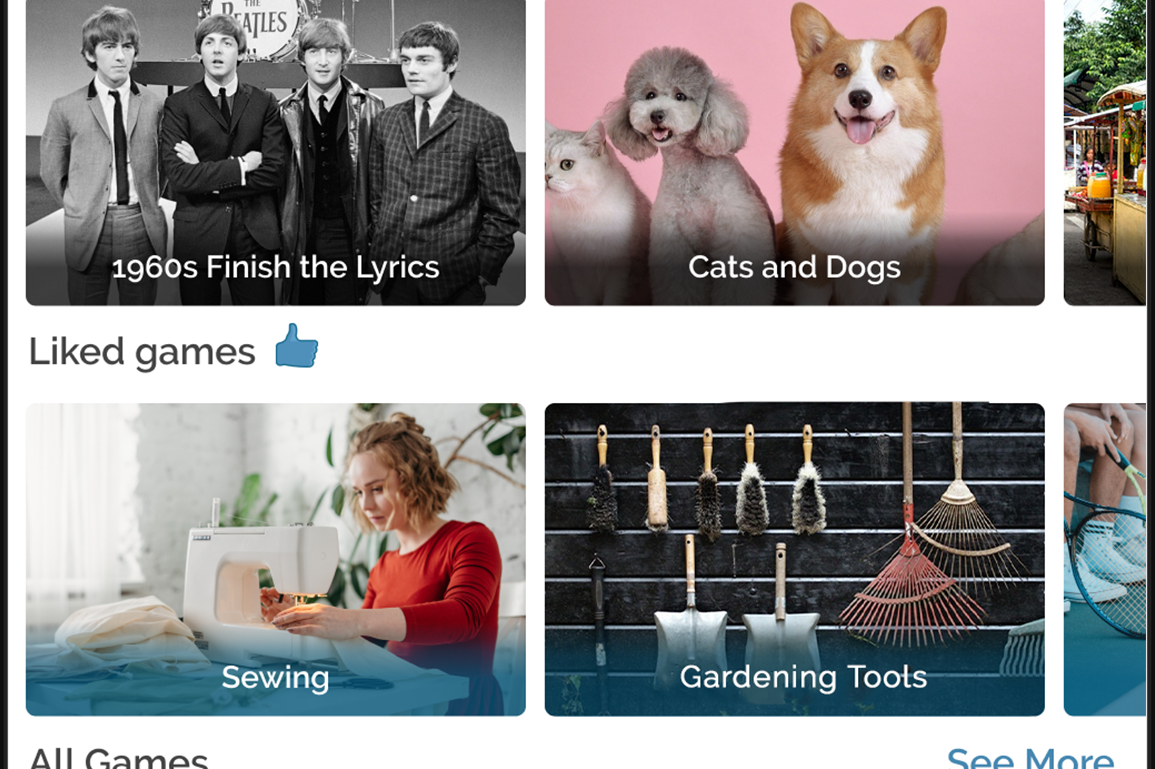Their AI-enabled Personalised Digital Reminiscence Platform will empower family members and carers to more easily engage with and calm people living with dementia
By Mr John Stevenson (Senior Communications Officer), Published
Memory Lane Games and City, University of London have been named as semi-finalists in the Longitude Prize on Dementia for their AI-enabled Personalised Digital Reminiscence Platform with In-home Remote Monitoring.
They have been awarded one of 24 Discovery Award grants worth £80k as part of the £4.2m Longitude Prize on Dementia.
The Discovery Awards are the first stage in finding the eventual prize winner of the Longitude Prize.
The Award is backed by the Alzheimer’s Society and Innovate UK and is delivered by Challenge Works.
The Longitude Prize on Dementia will be awarded to the creator of a breakthrough technology that learns from a person living with dementia, adapting and compensating for their condition as it progresses, and enabling them to continue living independently for longer.
Organisers of the Longitude Prize say the technology “must be able to demonstrate a transformational improvement in the lives of users, helping them to retain independence in one or more of the areas that contributes to their wellbeing and quality of life, including: essential activities of daily living, communication and social interactions; and other activities that enable them to lead a fulfilling life doing things they enjoy.”
 Through the technology they are developing, City researchers in Games, Human-Computer Interaction, and Artificial Intelligence, together with Memory Lane Games, aim to improve quality of life for people living at home with dementia through reminiscence games that they can continue to enjoy over time, promoting a sense of self, achievement and cognitive resilience.
Through the technology they are developing, City researchers in Games, Human-Computer Interaction, and Artificial Intelligence, together with Memory Lane Games, aim to improve quality of life for people living at home with dementia through reminiscence games that they can continue to enjoy over time, promoting a sense of self, achievement and cognitive resilience.
The solution which City and Memory Lane Games are working on builds on Memory Lane Games’ existing reminiscence games. It will empower family members and carers to more easily engage with and calm people who live with dementia, foster conversations with them on shared topics, and provide 15-20 minute windows of daily respite to address carer burden. Tracking user performance provides a rich data set to be used with machine learning to potentially detect changes in health. Co-design will help ensure that the games are accessible and deliver a positive user experience.
Project lead at City, Dr Chris Child, says:
“We are pleased to be working alongside Memory Lane Games on technology which will reduce carer burden - shown to be a key trigger for entry into care for people with dementia. The games will be co-designed and will use gamification and AI to learn and adapt content/challenge for each individual. We will explore how tracking user performance might help us to identify changes in cognitive performance and potentially changes in health.”
The co-design focus of the collaboration will be led by Professor Stephanie Wilson, Co-Director of City’s Centre for Human-Computer Interaction Design, with expertise in user experience design and co-design with people with disabilities. Dr Tillman Weyde is a co-investigator on the project.
People at City: Chris Child (project lead at City), Stephanie Wilson, Tillman Weyde.
Memory Lane Games are committed to co-design, seeking to include people with dementia and their carers, families and clinicians. They have worked directly with Speech and Language Therapists (UK, US, Philippines); Alzheimer's Disease Associations in the UK, Philippines, Uganda, Zambia and Greece for extensive user testing, co-design and content co-creation from people with dementia, families, memory cafe nurses, carers, neurologists and clinicians; and dementia care groups.
 CEO & Co-Founder of Memory Lane Games, Bruce Elliott, says:
CEO & Co-Founder of Memory Lane Games, Bruce Elliott, says:
Bruce Elliott, CEO & Co-Founder of Memory Lane Games, said:
“Our app already makes a difference to people living with dementia and their carers and with our proposed adaptive AI models, co-designed to be accessible and fun, we will learn to deliver continued engagement, critical to adoption and ongoing use, in order to foster reminiscence and positive socialisation. Ultimately we will improve and extend the quality of life for people living at home with dementia, addressing their daily communications and social interaction needs with activities they can enjoy playing for years, promoting a sense of self, achievement and cognitive resilience.”
“Our existing Memory Lane Games app has had 90,000 downloads and currently delivers 1000s of hours of gameplay every month for people with dementia (Google Analytics 2020-2022). Memory Lane Games co-designed a localised Filipino app with the Alzheimer's Disease Association of the Philippines (ADAP), documented in a published Case Study by ADI (www.alzint.org), with a neurologist noting that ‘the app makes it easier to take care of my patients.’”
Please visit us at City HCID and at Memory Lane Games, to find out more about this and other research opportunities and activities.
